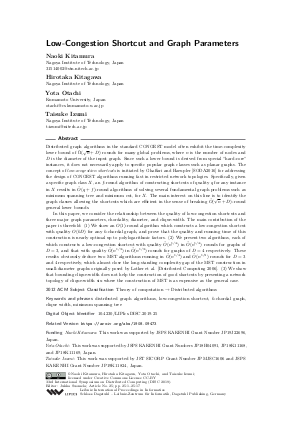@InProceedings{kitamura_et_al:LIPIcs.DISC.2019.25,
author = {Kitamura, Naoki and Kitagawa, Hirotaka and Otachi, Yota and Izumi, Taisuke},
title = {{Low-Congestion Shortcut and Graph Parameters}},
booktitle = {33rd International Symposium on Distributed Computing (DISC 2019)},
pages = {25:1--25:17},
series = {Leibniz International Proceedings in Informatics (LIPIcs)},
ISBN = {978-3-95977-126-9},
ISSN = {1868-8969},
year = {2019},
volume = {146},
editor = {Suomela, Jukka},
publisher = {Schloss Dagstuhl -- Leibniz-Zentrum f{\"u}r Informatik},
address = {Dagstuhl, Germany},
URL = {https://drops.dagstuhl.de/entities/document/10.4230/LIPIcs.DISC.2019.25},
URN = {urn:nbn:de:0030-drops-113328},
doi = {10.4230/LIPIcs.DISC.2019.25},
annote = {Keywords: distributed graph algorithms, low-congestion shortcut, k-chordal graph, clique width, minimum spanning tree}
}

 Creative Commons Attribution 3.0 Unported license
Creative Commons Attribution 3.0 Unported license
